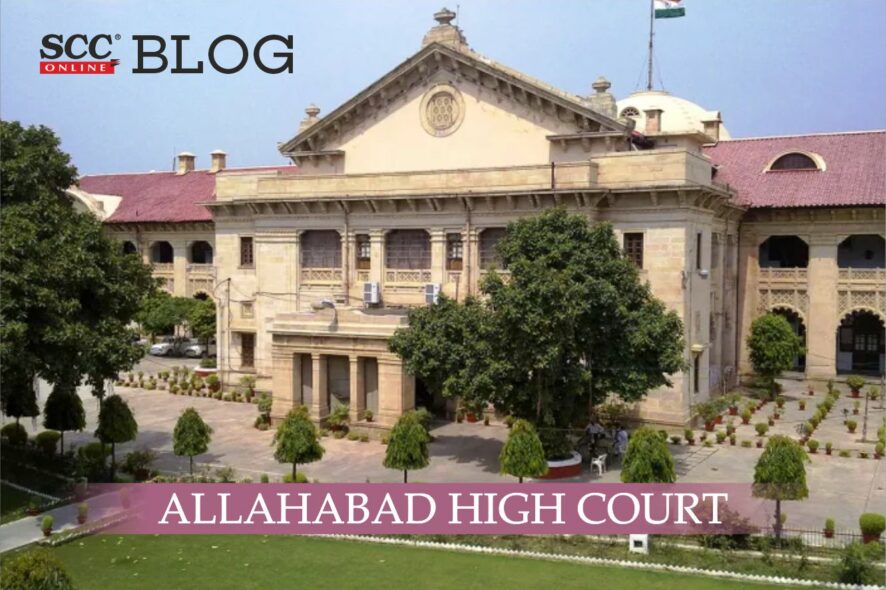Allahabad High Court: In a petition under Article 227 of the Constitution of India to set aside the judgements passed by the Trial Court and by the Sessions Judge (Revisional court), Samit Gopal, J. has observed that it is trite law that there must be “legal evidence” in support of the allegations levelled against a person and as in the present case the only evidence relied upon is the newspaper reporting that is not “legal evidence” and just a “hearsay evidence”, thus, the said orders are upheld.
In this case, a complaint was filed in 2019 by the petitioner against Chief Minister of U.P. Yogi Adityanath for offences under Sections 295(A), 298, 419, 420, 501 of the Penal Code, 1860, as in 2018 he addressed a public meeting with regards to the general Vidhan Sabha Elections in Rajasthan, in which he stated certain words for Lord Bajrangbali due to which the religious sentiments of public who are followers of Sri Bajrangbali have been hurt. The Petitioner submitted that the said fact has been read by him and other persons in daily newspapers due to which the religious sentiments of other persons also got hurt. Further, the Civil Judge dismissed the said complaint under Section 203 of Code of Criminal procedure (CrPC) with the observation that the court has no territorial jurisdiction to entertain the same; and later the criminal revision was also dismissed by the sessions judge.
The Court viewed that this Court is a supervisory Court under Article 227 of Constitution; and as there have been concurrent findings by the Trial Court and Revisional Court, this Court cannot act as a Court of first appeal to reappreciate, reweight evidence or facts upon which determination under challenge is based, as when the final finding is justified, the supervisory jurisdiction cannot be used to correct it.
The Court viewed that the backbone of the present complaint is the news published in a local newspaper and the complainant and his witnesses were not present in the said meeting where the words as said to have been hurt their religious sentiments, faith and have caused disrepute to Lord Bajrangbali. Further, the complainant in his statement under Section 200 CrPC states that he heard, saw and read the same in print media and electronic media, but his witnesses in the inquiry under Section 202 CrPC stated of reading the same in daily newspapers, but there is nothing on record to corroborate the same, thus, it is too vague to be believed. It was further observed that the reporting in the newspaper must be fortified whether it is correct or not, as it is hearsay secondary evidence and unless the person reporting it is examined, it is not admissible.
The court placed reliance on the decisions in Samant N. Balkrishna v. George Fernandez, (1969) 3 SCC 238; Laxmi Raj Shetty v. State of T.N., (1988) 3 SCC 319; Quamarul Islam v. S.K. Kanta, 1994 Supp (3) SCC 5; Ghanshyam Upadhyay v. State of U.P., (2020) 16 SCC 811; Kushum Lata v. Union of India, (2006) 6 SCC 180 and Rohit Pandey v. Union of India, (2005) 13 SCC 702, and observed that newspaper report by itself do not constitute evidence of the contents of it and are only hearsay evidence. They must be proved either by production of the reporter who heard the said statements and sent them for reporting or by production of report sent by such reporter and production of the Editor of the newspaper or it’s publisher to prove the said report; thus, newspaper report is not “legal evidence” which can be examined in support of the complainant.
The Court further observed that the Trial Court has rightly followed the procedure and passed the impugned order; and was even cognizant of the fact that summoning a person in a criminal case is a serious matter. Moreover, the Civil judge (Court at Mau) had no territorial jurisdiction to entertain the said complaint, thus, dismissal of the same vide order dated 11.03.2022 under Section 203 CrPC was just and proper. Further, the dismissal of the revision petition is also without any illegality, irregularity and perversity, as the revisional court while deciding the revision against the impugned order has also considered every aspect of the matter and then has come to its conclusion that the order does not suffer from any illegality and has dismissed the revision. Thus, the Court affirmed the orders of the Trial Court and Revisional Court; and imposed a token cost of Rs. 5,000/- on the petitioner to abuse the process of Law.
[Naval Kishor Sharma v. State of UP, 2022 SCC OnLine All 677, decided on 30.09.2022]
Advocates who appeared in this case:
In Person, Counsel for the Petitioner;
Government Advocate, Counsel for Respondent.






